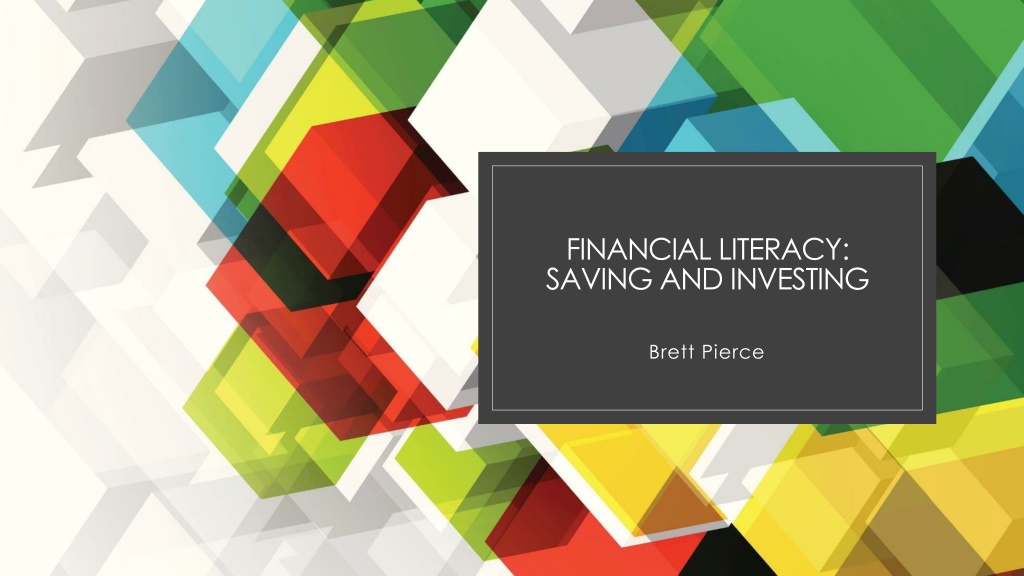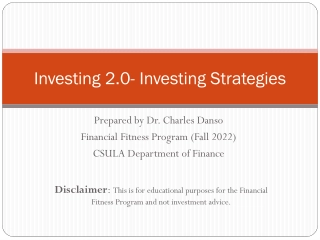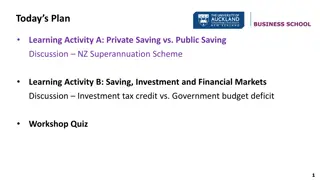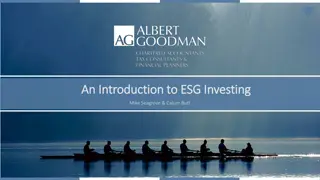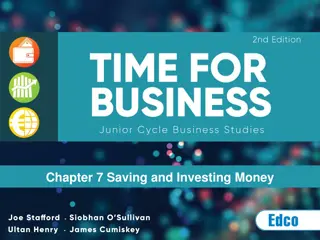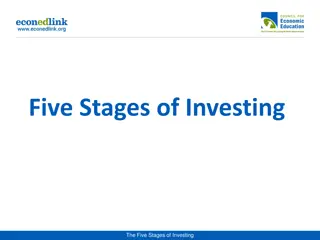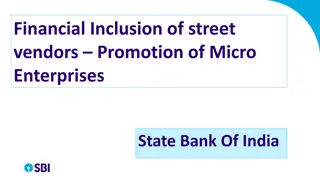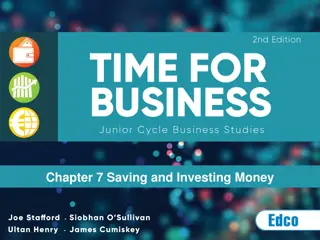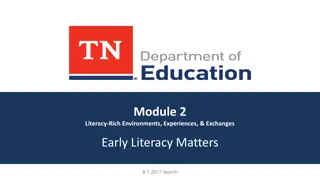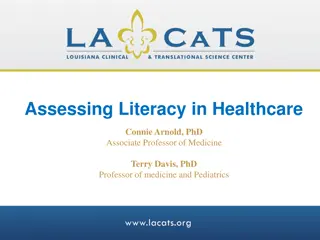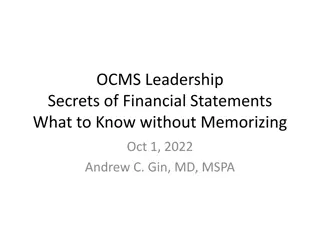Financial Literacy: Saving and Investing Tips
Learn about budgeting, saving strategies, and investment options from a finance professional. Explore various financial products like savings accounts, certificates of deposit, bonds, stocks, real estate, mutual funds, and ETFs. Gain insights into building an emergency fund, setting a budget, and growing your money wisely. Discover the benefits and drawbacks of different investment vehicles to make informed financial decisions.
Uploaded on Feb 23, 2025 | 1 Views
Download Presentation

Please find below an Image/Link to download the presentation.
The content on the website is provided AS IS for your information and personal use only. It may not be sold, licensed, or shared on other websites without obtaining consent from the author.If you encounter any issues during the download, it is possible that the publisher has removed the file from their server.
You are allowed to download the files provided on this website for personal or commercial use, subject to the condition that they are used lawfully. All files are the property of their respective owners.
The content on the website is provided AS IS for your information and personal use only. It may not be sold, licensed, or shared on other websites without obtaining consent from the author.
E N D
Presentation Transcript
FINANCIAL LITERACY: SAVING AND INVESTING Brett Pierce
Who Am I? Born in Rochester, MN Parents worked for Federal Bureau of Prisons, moved to Florida, West Virginia, and South Carolina Graduated from University of South Carolina (Columbia, SC) where I studied Finance and Math Moved to Greenville, SC in 2011 where I ve lived since Worked within Financial Services and Internal Audit at two public companies Presently an Internal Audit Manager with a Non-Bank Mortgage Lender & Servicer Personal Interests include: Investing Following My Favorite Sports Teams (Green Bay Packers / USC Gamecocks / Atlanta Braves) Spending time with my dog Apollo
Budget and Savings Review Know your monthly income, set your budget, and monitor regularly. Set a budget for your needs (housing, food, utilities, transportation, insurance, etc), wants (entertainment, dining out, technology, clothes, etc), debt repayment, and savings. Build an emergency fund in case you get sick, lose your job, or other events outside of your control (COVID Pandemic). In simple terms SAVE MORE THAN YOU SPEND!
How Do I Grow My Money? Savings Accounts Certificates of Deposit Bonds Stocks Real Estate Mutual Funds Exchange Traded Funds (ETFs)
Savings Accounts Definition: An interest-bearing deposit account held at a bank or other financial institution. Uses Earn interest but still have ability to withdraw funds Easy to open and easy to access funds FDIC insured (if bank is member of FDIC) up to $250,000 FDIC = Federal Deposit Insurance Corporation Credit unions are covered by National Credit Union Association (NCUA) for same amount Drawbacks Sometimes require minimum deposits Very low interest rate offerings; can fluctuate based on market Limits to how often you withdraw funds per year Recommendation open an online High Yield Savings Account (HYSA)
Certificate of Deposit (aka CD) Definition: a savings account that holds a fixed amount of money for a fixed period of time in exchange for interest to be paid by issuing bank. Uses: FDIC Insured / NCUA Insured Typically offer higher interest rates than traditional savings accounts Drawbacks: Higher minimum deposit requirements (vs. savings accounts) Early withdrawal penalties May be callable by the issuing bank Fixed Rate may not reflect interest rate changes over life of CD
Bonds Definition: fixed income instrument that represents a loan made by an investor to a borrower (or issuer); issuers can include Federal, State, or Local Governments, Governmental Entities, and Corporations. Uses: Investor receives regular recurring payments in form of interest Bonds will increase in value if interest rates fall Able to sell bond to another investor before maturity date Holding until bond matures will return your original investment, plus any interest received from issuer Drawbacks: Return on investment is historically lower than stock market over long term Borrower may default on loan bonds are not guaranteed Value may decrease if interest rates rise
Stocks Definition: security that represents the ownership of a fraction of a corporation or company; entitles the owner to a proportion of the company s assets and profits equivalent to how many shares they own. Uses: Historically outperformed most other investment options in the long run (think decades) May pay a regular dividend (distribution of profits by a corporation to its shareholders), usually quarterly. Can be reinvested to buy more shares of stock. Very easy to buy and sell (i.e., a liquid asset) Drawbacks: Value can be volatile and subject to market fluctuations True value of a company can be difficult to calculate or estimate Tax considerations see dividend income and realized gains Lower priority for repayment behind creditors (i.e., bondholders) and preferred stockholders if a company declares bankruptcy or goes out of business.
Mutual Funds & Exchange Traded Funds Mutual Fund: professionally managed investment fund that pools money from many investors to purchase securities. Exchange Traded Fund: type of investment fund traded on the stock market. Uses: Diversified across multiple asset classes and within multiple investment types (bonds, stocks, money markets, other fixed income). Professionally managed by experienced individuals that may change investment balance over time to maximize returns. Transparency Drawbacks: Fees! Even expense ratios between 1% - 2% can turn into $100,000s over decades. Beware of Actively Managed funds see Fees above. No opportunity to customize investment within fund.
Real Estate Definition: property consisting of land and / or buildings; the land along with any permanent improvements attached to the land, whether man-made or natural; Residential: any property used for residential purposes, such as single family homes, condos, townhouses, etc. Commercial: any property used exclusively for business purposes, such as grocery stores, hospitals, hotels, offices, restaurants, etc. Industrial: any property used for manufacturing, production, distribution, or storage, such as factories, power plants, and warehouses. Uses: Homeownership! An asset that can be borrowed against. Steady recurring income from rental property. Tax write-offs Drawbacks: Takes time to sell (i.e., illiquid asst) Requires large upfront investment Value can fluctuate based on market conditions see Late 2000 s Financial Crisis
Words of Caution on Investing There is always some level of risk associated with investing, meaning you could lose your money. Be aware of the risks associated with each investment you choose and which fits your preferences. Be wary of anyone telling you an investment is a sure thing . This should be a red flag. Be wary of hidden fees relating to any investment, brokerage, or retirement account. While appearing small, over time they can eat $100,000s in your savings. Understand what it is you re investing in before making your final decision this can apply to individual stocks or bonds, or more recent newsworthy items such as cryptocurrency.
Retirement Definition: withdrawal from one s position, career, or working life. In other words, do with your time as you wish without worrying about trading your time for wages. Types of Accounts 401k: employer-sponsored pension account that allows employees to make tax-deferred ( pre-tax ) contributions; employers will commonly offer an employee match to contribute towards your retirement. Contribution Limit: $19,000 (Annually) Age to Withdraw: 59.5 Years Old Individual Retirement Account: type of savings account with tax advantages ( pre-tax ) that individuals can use to save and invest long-term. Contribution Limit: $6,000 (Annually) Age to Withdraw: 59.5 Years Old ROTH IRA: Contributions are not tax-deductible, but distributions are tax free. Income limits currently set at $140,000. Brokerage Account: arrangement in which an investor deposits money with a licensed brokerage firm, which places trades on behalf of the customer; assets belong to customer; no tax advantages.
Why Should I Start Saving & Investing? Time Value of Money widely accepted concept that it is better to receive a sum of money now than it is to receive that same sum of money at a later date. Weighs the opportunity cost of spending rather than saving. Present Value the current worth of a future sum of money or stream of cash flows, given a specified rate of return. Future Value the value of an asset or cash at a specific date in the future, based on the value of that asset in the present. NPER number of periods within 1 year (e.g., monthly = 12 NPER) Rate of Return net gain or loss of an investment over a period of time, typically expressed as a percentage
Time Value of Money Example Person A Person B Starts Saving and Investing Now Puts off Saving until 2035 Starts with $0 (Present Value) Starts with $5,000 (Present Value) Saves $100 per Month Saves $250 Per Month Annual Return = 6% Annual Return = 6%
Time Value of Money Example $120,000.00 $100,000.00 $80,000.00 Savings $60,000.00 $40,000.00 $20,000.00 $0.00 1 2 3 4 5 6 7 8 9 10 11 12 13 14 15 Years 16 17 18 19 20 21 22 23 24 25 26 27 28 29 30 Person A Person B
What Did We Learn? Time is the most powerful factor in building savings. Person A only contributed $36,000 over 30 years ($100 * 12 months * 30 years). Person B had to contribute $50,000 ($250 * 12 months * 15 years + $5,000 upfront investment) and still didn t have as much money as Person A at the end.
Any Advice? I m not a Financial Planner, but Open an Online High Yield Savings Account. Most offer 0.50% interest rates. Do a cost benefit analysis for whether to go to a 4-year college or determining which college is right for you. Ask yourself is it worth it to end up with $100,000 for an entry level job that may pay you $40,000? Know what career fields are possible with your degree and what you re likely to make in your career. Can you take your first year courses at a Technical or Community College to be transferred to a 4-year university? Are you better suited to get an Associates Degree for your career vs. a Bachelors Degree? Open a Roth IRA account once you turn 18 and start contributing. Make sure this is money you won t need in the immediate future. Retirement accounts come with early withdrawal fees before age 59.5. Learn more about the stock market. Stocks (balanced with other assets) can grow your portfolio 6% - 8% per year. Familiarize yourself with these terms: S&P 500 Dow Jones Industrial Average Russell 2000
Recommended Content The Money Guy Show lots of interesting topics on saving, retirement, buying a home, and so forth. https://www.youtube.com/c/MoneyGuyShow The Retirement Gamble (PBS) - FRONTLINE investigates the big business of retirement, raising troubling questions about how America's financial institutions protect our savings. https://www.youtube.com/watch?v=lkOQNPIsO-Q&list=PLF6D731H680DKfik7NPmQUlPyt165BnGS&index=33 PANIC: The Untold Story of the 2008 Financial Crisis https://www.youtube.com/watch?v=QozGSS7QY_U&list=PLF6D731H680DKfik7NPmQUlPyt165BnGS&index=16
